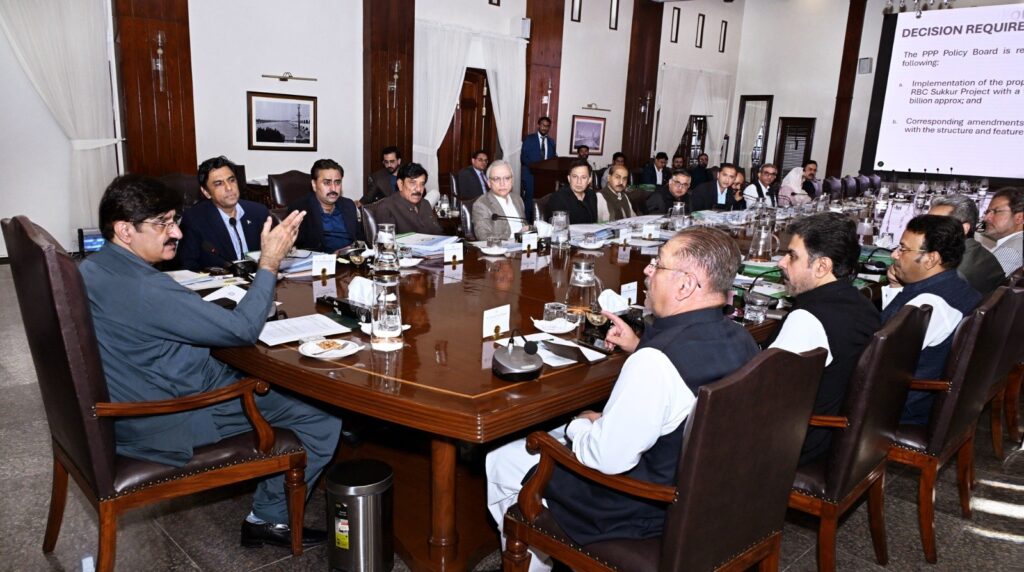Staff Reporter

Karachi: Sindh Chief Minister Syed Murad Ali Shah on Thursday chaired the 48th Public-Private Partnership (PPP) Policy Board meeting, approving a slate of major development projects across transport, health, environment, and agriculture sectors — including the introduction of 500 electric buses in Karachi and Hyderabad and the Karachi Port–Qayumabad Elevated Expressway.
Electric Buses for Karachi and Hyderabad
The Board approved the Peoples Green Transport Project, paving the way for a fleet of 500 electric buses to be deployed in phases across Karachi and Hyderabad.
The project, to be executed on a Design-Build-Finance-Maintain-Operate-Transfer (DBFMOT) model over 12 years, will include charging depots, bus shelters, and an automatic fare system. It is expected to serve more than 200,000 passengers daily and integrate with the city’s Green Line BRT.
The CM termed the initiative a “landmark move” toward clean, modern, and efficient urban transport in Sindh.
Karachi Port–Qayumabad Elevated Expressway
The Policy Board also cleared the Karachi Port–Qayumabad (Jam Sadiq Interchange) Elevated Expressway Project, which will connect Karachi Port’s East Wharf to the Jam Sadiq Interchange via a 16.5 km, four-lane elevated expressway.
The project will reduce freight distance by 26 km, allowing 24/7 heavy vehicle movement while easing congestion and improving port efficiency.
The expressway, to be built under a DBFOT user-pay model, will receive viability gap funding and a 10-year minimum revenue guarantee from the Sindh government.
Health Sector Reforms
To strengthen healthcare infrastructure, the Board approved a fixed and variable cost-based annuity model for Regional Blood Centres (RBCs) in Sukkur, Karachi, and Shaheed Benazirabad, mirroring the framework used in Jamshoro. Each centre will issue about 250,000 free blood bags annually to government hospitals.
The Board also sanctioned PDF funding for transaction advisors to explore the outsourcing of radiology and diagnostic labs at Jinnah Postgraduate Medical Centre (JPMC) and Chandka Medical College Hospital (CMCH), ensuring improved equipment, trained staff, and faster test results through private-sector partnerships.
Meanwhile, the Sindh Government Children Hospital, North Karachi, received approval for its 10th-year operational budget of Rs738.65 million and Rs95.12 million in capital expenditure to maintain service quality.
Climate and Carbon Projects
In a major environmental move, the Board approved a riverine forestation project spanning 41,000 hectares in Jamshoro and Matiari districts under the PPP mode. Expected to generate 35–40 million carbon credits, the project aims to restore Sindh’s riverine forests and earn foreign exchange via international carbon markets.
The Board also allowed the Asian Development Bank (ADB) to conduct a feasibility study for an expanded 88,000-hectare riverine forest project.
Agriculture Modernisation
Sindh’s agriculture sector is set for an overhaul through the Rice and Wheat Mechanisation Project, which will introduce modern farming machinery for rental use, enhancing crop productivity.
Additionally, a feasibility study was approved for a Tomato Cluster Farming and Processing Project in Thatta, with plans to replicate similar hubs across Sindh.
Science & Technology Innovation
The Board gave the green light for signing the Concession Agreement of the NED Science & Technology Park Project, the country’s first university-based tech park under the PPP model.
Developed in partnership with Enertech Holding Company, a subsidiary of the Kuwait Investment Authority, the agreement is expected to be formalised by the end of October 2025.























